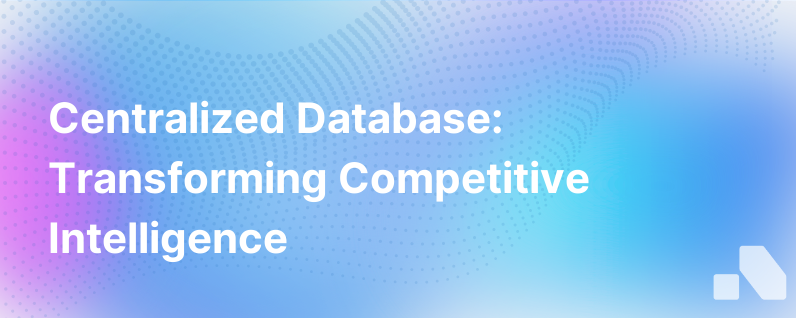
In today's fiercely competitive B2B environment, staying ahead of the competition is not a luxury - it's a necessity. For that, you need tightly based on the 'who', 'what' and 'how' of your fiercest competitors. And such information can only be accurately assembled and effectively illustrated in a centralized competitive database.
Before we delve deeper into the need for a centralized competitive database, it's essential to understand what it is, the problems it solves, and its key elements.
What is a Centralized Competitive Database?
Simply put, a centralized competitive database is a unified repository of all your competitor data, collected from various channels, neatly organized, and easily accessible. The database is designed to provide deep insights into competitor strategy, offerings, pricing, marketing tactics, and customer feedback. This equips your sales, marketing, and product teams with the knowledge they need to outperform competitors.
Problems That A Centralized Database Solves
Effective competitive analysis is not just a data collection exercise. It is about synthesizing information into meaningful insights that inform your product, marketing, and sales strategies.
However, organizations often face three core challenges:
- Data is scattered across multiple sources: From sales teams to customer support, market research reports to social media platforms, valuable insights often exist in silos, buried in various repositories.
- Data is outdated quickly: In fast-moving industries, competitive landscapes can rapidly shift. Old information can lead to false assumptions and missed opportunities.
- Data is not easily actionable: Raw data needs to be organized into an easily digestible format to lead to quick decision-making.
A centralized competitive database can solve these challenges by providing a single point of truth for competitive intelligence, ensuring real-time updates, and enabling actionable insights.
Key Elements of a Centralized Competitive Database
Building an effective database involves the following elements:
Competitor Profiling: Detailed breakdowns of your competitors' overall strategy, including their product offerings, target markets, positioning, pricing, messaging, expansions, and partnerships.
Competitive Landscape Mapping: An illustrative matrix or diagram that visualizes where each competitor sits in relation to various factors such as product features, market share, and customer satisfaction.
SWOT Analysis: A deep dive into each competitor's Strengths, Weaknesses, Opportunities, and Threats.
Product Comparison: A feature-by-feature comparison of your products with competitors'.
Market and Customer Trends: Updates on the latest market trends, customer preferences, and feedback, and how competitors are responding to these changes.
Collaborative Space: A space for sales, marketing, and product teams to update and view competitor information.
Setting up Your Centralized Competitive Database
Firstly, you need to identify the right tool to house your database. The tool should be easily accessible and collaborative. CRMs are a popular choice, but some companies prefer databases managed in project management tools.
Once the tool is chosen, you have to identify key competitors, perform in-depth research, and fill your database with the necessary intelligence. Finally, you have to ensure that the database is updated regularly and that insights are communicated to the relevant teams.
Conclusion
In summary, a centralized competitive database is an essential tool for B2B companies in today's intensely competitive environment. It allows you to consolidate scattered competitor information, keep it updated, and transfer it into actionable insights. This can lead to more informed strategies, better product development, closed sales deals, and overall competitive advantage.
Perhaps the only hitch could be the time and resources that go into setting this up and maintaining it- which is a hurdle swiftly taken down by innovative B2B tools like Aomni. With AI-enabled competitive intelligence, real-time insights, and account-specific advice, it's like having your very own centralized competitive database, without any of the hassles.